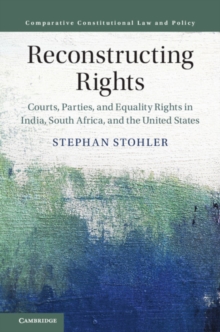Description
| Product ID: | 9781108493185 |
| Product Form: | Hardback |
| Country of Manufacture: | US |
| Series: | Comparative Constitutional Law and Policy |
| Title: | Reconstructing Rights |
| Subtitle: | Courts, Parties, and Equality Rights in India, South Africa, and the United States |
| Authors: | Author: Stephan Stohler |
| Page Count: | 280 |
| Subjects: | Comparative politics, Comparative politics, Corruption in politics, government and society, Comparative law, Constitutional and administrative law: general, Government powers, Judicial review, Local government law, Criminal law: procedure and offences, Political corruption, Comparative law, Constitutional & administrative law, Government powers, Judicial review, Local government law, Criminal law & procedure |
| Description: | Select Guide Rating Reconstructing Rights will appeal to several audiences because of its deliberative-partnership thesis, including public law scholars for its social-scientific approach to the study of legal doctrine; legal scholars because it challenges broadly held commitments to judicial supremacy; and area-specialists for its cross-national investigation of equality rights. Judges often behave in surprising ways when they re-interpret laws and constitutions. Contrary to existing expectations, judges regularly abandon their own established interpretations in favor of new understandings. In Reconstructing Rights, Stephan Stohler offers a new theory of judicial behavior which demonstrates that judges do not act alone. Instead, Stohler shows that judges work in a deliberative fashion with aligned partisans in the elected branches to articulate evolving interpretations of major statutes and constitutions. Reconstructing Rights draws on legislative debates, legal briefs, and hundreds of judicial opinions issued from high courts in India, South Africa, and the United States in the area of discrimination and affirmative action. These materials demonstrate judges'' willingness to provide interpretative leadership. But they also demonstrate how judges relinquish their leadership roles when their aligned counterparts disagree. This pattern of behavior indicates that judges do not exercise exclusive authority over constitutional interpretation. Rather, that task is subject to greater democratic influence than is often acknowledged. |
| Imprint Name: | Cambridge University Press |
| Publisher Name: | Cambridge University Press |
| Country of Publication: | GB |
| Publishing Date: | 2019-07-18 |


